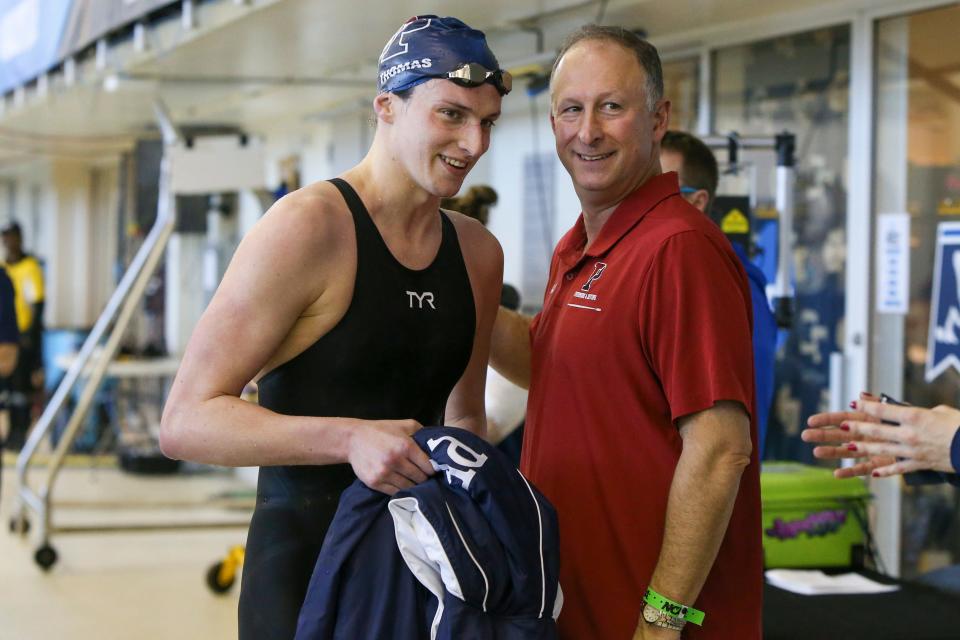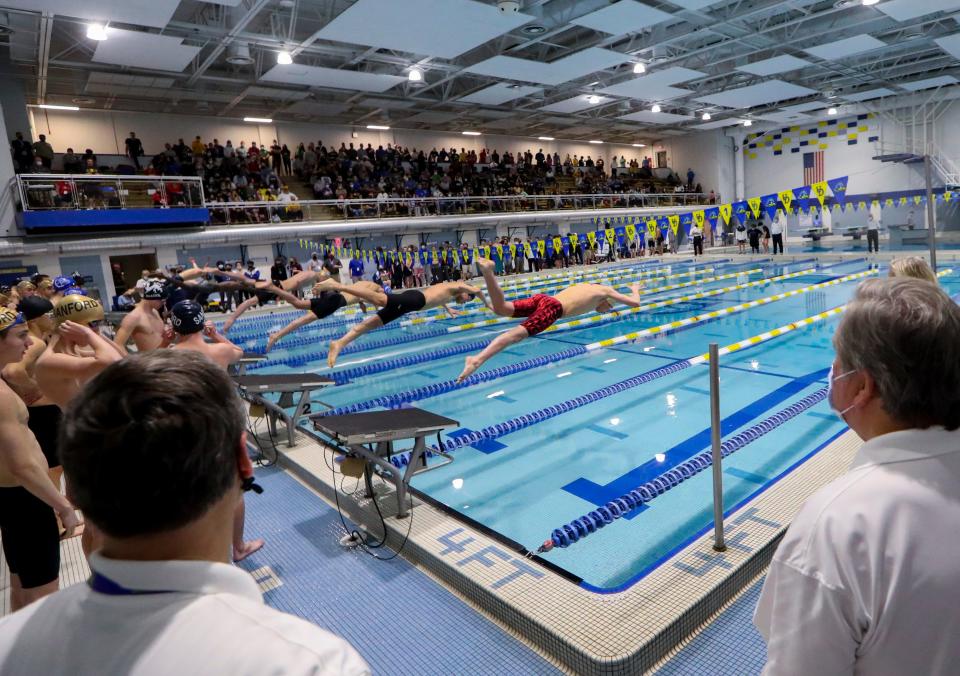Why transgender athletes' futures are being decided by politicians in Delaware
Transgender women athletes have become pawns in another polarizing political battle between the left and the right.
Despite federal anti-discrimination laws ensuring trans athletes have a place on playing fields, courts and tracks and in swimming pools, there are efforts in state governments across the country to bar them.
In more than a dozen states, legislation has been proposed, approved or enacted that would prevent transgender athletes, mainly girls, from playing on sports teams corresponding to the gender with which they identify.
That includes Delaware, where on March 23 the Senate Health and Social Services Committee listened to Sen. Bryant L. Richardson, a Republican who represents southwestern Sussex County, describe how womens sports are doomed by the inevitable intrusion of transgender girls flexing their supposed superiority in size, strength and speed.

“Without Senate Bill 227,” Richardson said, “we’ll have co-ed sports and we’ll have male sports. Female sports will be eliminated.”
The Delaware Senate Health and Social Services Committee happens to be chaired by Sarah McBride, who in 2020 became the first openly transgender state senator in the country.
At one point, McBride humorously asked Richardson, "So you believe that I have a biological advantage over Elena Delle Donne in basketball?," referring to the 2016 Olympic gold medalist and two-time WNBA MVP.
But her tone throughout was serious and unyielding in defending the rights and expressing the plight of transgender kids, who suffer from significantly higher rates of anxiety, depression, bullying, attempted suicide and suicide, according to the Centers for Disease Control and Prevention.
"The courts have consistently held," she said, "that when you make this type of determination, and cisgender students can participate with students consistent with their gender identity, and transgender students cannot participate with their gender identity, even if the legislation doesn’t say 'transgender,' that that is discrimination."
The term “cisgender” refers to someone who identifies with the gender assigned at birth.
McBride termed the proposed Delaware Senate bill "part of a national strategy that is seeking to ban trans kids from affirming health care, ban certain books, forbid discussions and rip trans kids away from supportive parents."

Richardson could cite no specific examples of transgender athletes in Delaware leading this coming onslaught. He claimed it threatened the superiority of championship outfits such as Delmar High’s nationally ranked field hockey team, winner of 96 straight games and six DIAA titles in a row.
His move followed a trend that has seen Republican lawmakers nationwide pursuing legislation limiting opportunities for transgender athletes while stoking such fear, without citing examples of a negative local impact.
The Associated Press reported last year that more than 20 states had seen bills aimed at preventing transgender girls from playing on girls teams.
“Yet in almost every case,” the story read, “sponsors cannot cite a single instance in their own state or region where such participation has caused problems.”
SHAKY EVIDENCE? Conservatives want to ban transgender athletes from girls sports
The Delaware Association of Athletic Directors, consisting of athletic directors at the state’s 50-some high schools, could not account for any transgender students presently playing on any teams, said president Mike Hart.
Privacy rules play a part in that, as there are certainly transgender students at First State high schools. But no such examples have surfaced due to athletic performance.
“This is not about sports. It’s a way to attack trans people,” Chase Strangio, a transgender-rights attorney with the American Civil Liberties Union, told the Associated Press, adding that health care addressing the needs of young transgender people has also been under assault.
In an interview after the hearing, Richardson re-iterated that “this is going to be an issue” and it was crucial to address “the problem,” he said, before there actually is one.
Richardson said he was motivated by discussions he had with various Delaware residents and the recent success of University of Pennsylvania swimmer Lia Thomas, a transgender woman who won the 500 freestyle at the 2022 NCAA Swimming and Diving Championships. She’d spent her first three seasons on the Penn men’s team.
Richardson also mentioned what happened from 2017-19 in Connecticut, where transgender girls won numerous state track championships.
“If there’s even one, it’s a problem,” Richardson said, referring to transgender girls playing on female teams.
Men may have inherent anatomical advantages in size, strength, muscle mass and oxygen capacity over women. Testosterone suppression therapy decreases some performance edges.
Even so, every human has a unique physical makeup that goes beyond broad characterization. Dr. Anna B. Filip pointed this out in public comment during the Senate hearing. Filip is a family medicine physician at Christiana Care Health System and heads its gender wellness program.
“The overgeneralization of trans bodies reduces trans students to a stereotype, promotes discrimination and ignores the diversity,” she said. “Trans bodies are as diverse as cis[gender] bodies, and assumptions to the contrary are reductive and incomplete.”
A 2016 study concluded that, “the athletic advantage transgender female individuals are perceived to have [based on indirect and ambiguous evidence] may be no greater than widely accepted physiological [e.g. large hands] and financial [e.g. training opportunities] advantages that some cisgender people possess in competitive sport.”

Despite the swimmer Thomas’ headline-grabbing, debate-inducing success, such examples are the exception.
Many transgender women and girls compete in relative anonymity, studies have shown, and their inclusion has not undermined participation by cisgender girls or ruined their chance to achieve.
A Human Rights Commission survey found only 30 percent of LGBT youth play sports regularly or on school, community or club teams, as opposed to half of non-LGBT kids.
States with more inclusive policies regarding transgender girls playing on sports teams actually have better participation rates, according to the Center for American Progress, a Washington, D.C.-based public policy research and advocacy organization, which used data from the national Youth Risk Behavior Survey.
"The collection of these bills nationally," McBride said, "including this legislation, seeks to strip away any layer of support that a trans kid may have – parents, doctors, therapists and, in this case, coaches and teammates, leaving trans kids isolated."
During the public comment portion of the committee hearing, among those who spoke up was a woman who identified herself only as “Goldie.” She described her trans daughter as a member of a “very small, vulnerable minority.”
When her daughter entered high school, she was required to play on an athletic team, even though she had little past experience or interest.
“She got what all kids get out of sports,” Goldie said. “Fresh air, exercise, new friends and the love of a lifelong sport.”
That led her to take up another for the first time, in which opponents will never, Goldie said, see that petite frame and pony-tail on the playing field and imagine she is transgender.
“This is the kiddo that’s so scary to you,” Goldie said.
Erin Ridout, a 36-year-old Middletown resident, also doesn’t see why there’s such a fuss.
Ridout played soccer in high school in Virginia before becoming a rugby player at Mary Washington University in Fredericksburg, from which she graduated in 2007. There, and on subsequent rugby club teams, it wasn’t unusual to play with and against transgender women.
And it wasn’t, she stressed, a big deal.
“This debate makes it sound like it’s something new and it’s just not new,” Ridout said. “Back when I was in college, there were trans athletes on other teams and it just wasn’t a concern among the players. ... Playing with and against these athletes, it never felt problematic. It never felt like a threat to my safety or anything like that.”
Ridout is 4-foot-11, she said, so opposing players may have already had some physical advantages over her.
But that’s part of sports also, she pointed out.
“Just like other females athletes, these [transgender] female athletes come in all different sizes and with all different abilities,” Ridout said. “Using their fear mongering, [critics] make it out to be a boogie man situation, and it’s just not.
“The things that I found intimidating were the athletes with a high level of skill. That’s what stands out. If you have personal experience, if you actually meet people and spend time with them on a team and socialize and things like that, it humanizes it and you can’t just hold it out there as this scare tactic because these are real people.”
Delaware bill goes nowhere
Richardson’s bill has not received the necessary majority of signatures from Health and Social Services Committee members to be released to the full Senate for a vote, likely ensuring its demise.
McBride had begun discussion of the bill by saying “I didn’t run for this office to talk about transgender identities ... But when legislation comes before me that goes after young people, that goes a step too far.”
She termed the proposal “a cruel solution in search of a problem.”

McBride cited legal decisions that have already come out protecting transgender people, including the Supreme Court’s 2020 Bostock v. Clayton County ruling, federal Title IX laws preventing discrimination based on sex and the Equal Protection Clause in the 14th Amendment to the U.S. Constitution.
“This is not even a question that state governments need to answer,” McBride later told Delawareonline/The News Journal.
During the committee hearing on the bill, McBride had been quite pointed in her disagreement.
“This bill in no way improves sports but it does send a message that trans people are not who we are,” McBride said. “When you categorically exclude trans students from extracurricular programs consistent with their gender identities, you are categorically excluding an entire group of kids from educational programs that teach teamwork and persistence and mutual support.”
After that, a majority of those during the public comment period also spoke out against the bill, though there were numerous supporters as well, including coaches, educators and athletes.
In a May 2021, Gallup poll, only 34 percent of respondents believed athletes should be permitted to play on teams corresponding to their gender identity, while 62 percent said they should only be able to play on teams of their gender at birth.
That poll also found that respondents who actually knew someone who was transgender were slightly more likely to support the concept of playing on sports corresponding with gender identity.
Roger Erdvig, the Wilmington Christian School headmaster, asked during public comment, “How many more Lia Thomas cases will we all need to see to recognize that we are colliding with reality?”
He then mentioned Iowa, where Gov. Kim Reynolds recently signed a bill into law similar to what Richardson proposed barring transgender women from taking part on girls high school and women’s college athletic teams.
“Forcing females to compete against males is the opposite of inclusivity and it’s absolutely unfair,” Reynolds said.
Only Republicans in the Iowa House and Senate supported the bill, with opponents calling it a quest to “solve a nonexistent problem.”

Alabama, Arkansas, Florida, Mississippi, Montana, Tennessee, Texas, South Dakota and West Virginia have recently passed such laws.
On March 22, Utah’s Republican governor Spencer Cox vetoed a bill put forth by GOP lawmakers preventing transgender students from playing on teams of their gender identity.
Cox, citing the high rates of suicide among transgender kids, felt it was unnecessary to pass a law that affected just four known students, only one a transgender girl, among the 75,000 playing scholastic sports in Utah.
“Rarely has so much fear and anger been directed at so few,” Cox wrote in a letter to the president of the Utah Senate and speaker of the house, which he also posted on Twitter.
In words that gained national headlines, he later added: “I don’t understand what they are going through or why they feel the way they do. But I want them to live.”
On March 25, the Utah Senate and House voted to override that veto.
Earlier that same week, Indiana’s Republican governor Eric Holcomb had vetoed similar legislation banning transgender women from playing on girls teams after it had been approved by the state’s GOP-led legislature.
The American Civil Liberties Union of Indiana had termed that “hateful legislation.” Republicans had said it was necessary to preserve opportunities for cisgender girls and prevent their places on teams and potential college scholarships from being taken by transgender women.
In making his case before Delaware’s Senate committee, Richardson had made the same claim, saying it was necessary to ensure “a level playing field.”
The presence of transgender girls on womens teams, he said, would result in “taking away rosters spots, playing time and potential scholarships, and in some sports increasing the chance of injury.’’
Richardson also repeatedly linked his proposal as a necessity to preserve and protect gains made since the passing of the Title IX gender-equity laws 50 years ago that paved the way for increased funding and participation in womens' sports.
Among those voicing their dissent of the bill during the public comment period was Richard James, parent of a non-binary child.
“There are probably no more than a handful of trans kids at any high school in Delaware,” he said, “not all of which play sport, but all of whom will hear in this law that they’re a threat, there is something wrong with them, and they are not awesomely and wonderfully made.”
Richardson’s proposed Senate bill was named The Fairness in Women’s Sports Act.
But during the committee hearing McBride and Democratic Sen. Marie Pinkney found his use of the word “fairness” ironic. Both suggested that, if Richardson was so concerned about equality for female athletes, there were areas that his attention might be more valuable.
“Address the real issues facing women’s sports,” McBride suggested.
That includes, Pinkney said, girls having the same access to sports equipment and coaching that boys have, as well as “the same financial resources as some of the children they play on teams with.”

U.S National Soccer Team icon Megan Rapinoe, who has been outspoken about allowing transgender girls to play on female teams, had made a similar point in a Washington Post opinion piece, writing, “As a woman who has played sports my whole life, I know that the threats to women’s and girls sports are lack of funding, resources and media coverage; sexual harassment; and unequal pay.”
Such financial imbalances and limited opportunities have become particularly clear in northern Delaware, where traditional public schools have had great difficultly competing with charter, magnet and private schools in many sports.
“Trans people have been playing on teams consistent with their gender identity, and losing, for years,” McBride told Delawareonline/The News Journal. “And, just as with cisgender athletes, there are inevitably going to be some who win. And, of course, those few who are winning, just as the few who are winning among cisgender athletes, get a little more attention for the fact that they win and then, of course, the controversy ensues around the transgender athlete and then, of course, more [media] coverage. And that’s all we hear about.
“We don’t hear about the 14-year-old transgender girl who is playing on the lacrosse team with her friends. We’re not hearing about the transgender people who are playing and their teams are winning and losing for no reason related to their transgender identities. ... Those who have a clear record of resisting inclusion and affirmation of transpeople in other areas of life jump on those stories and seek to spread misinformation, foment fear and codify discrimination.”
DIAA rules 'discriminatory'
Thomas had been on the Penn men’s team before having gender reassignment surgery and hormone replacement treatment. She won the 500 freestyle at the NCAA Swimming Championships in Atlanta in 4:33.24.
In second place, 1.75 seconds behind, was Emma Weyant, the silver medalist in the 400 individual medley at the 2021 Summer Olympics in Tokyo. Thomas also placed fifth in the 200 freestyle and eighth in the 100 freestyle.
Updated NCAA rules, approved in January by its Board of Governors, align college sports with U.S. and International Olympic committee standards in allowing each sport to determine its transgender participation standards “while balancing fairness, inclusion and safety for all who compete,” it said at the time.

Having gone into effect for winter NCAA championships, it does require that transgender student-athletes “document sport-specific testosterone levels beginning four weeks before their sport’s championship selections.” Beginning next season, those documented levels must be submitted at the beginning of the season and again six months later, as well as four weeks before championship selections.
Due to Delaware Interscholastic Athletic Association rules, Delaware is labeled as a state that has “discriminatory restrictions on participation,” according to transathlete.com.
DIAA rules do allow a transgender student to participate on teams that match their gender identity, but with conditions.
The student must provide either legal documentation, in the form of a revised birth certificate, passport or driver’s license, indicating the reassigned gender; medical certification they are undergoing transitional treatment; or a physician’s certification they are in the “process of transition to the reassigned sex.”
The student’s school will determine the student’s gender assignment for purposes of athletics. However, other schools may appeal to the DIAA board of directors about that student’s eligibility if they feel it “would adversely affect competitive equity or safety of teammates or opposing players.”
Such policies "risk seriously harming transgender youth by requiring unnecessary and invasive medical examinations that are ideologically driven, rather than consistent with the standards of care for routine treatment involving gender-expansive" students, according to the Center for American Progress, while continuing to "reinforce stereotypical gender norms around the types of bodies that are more athletic and the qualities connected with athleticism."
The DIAA is in the process of putting together a subcommittee to take a closer look at its regulations. In the meantime, two Delaware school districts have approved policies protecting the rights of transgender students.
In January of 2021, the Christina School District ruled transgender students were allowed to play on sports teams that correlated with their gender identity.
The Red Clay School District recently followed suit, deciding “a transgender or gender diverse student shall be permitted to participate in interscholastic athletics in a manner consistent with the student’s gender identity.”

Richardson had mentioned the Red Clay ruling in discussing the introduction of Senate Bill 227. But Red Clay school board member Adriana Bohm said that, in her nine years on the board, “I’ve never once heard a parent or student complain about the issue of transgender students in sports.”
She added that doesn’t mean there hasn’t been someone who perhaps did oppose transgender students playing on teams of the gender with which they identify, but she had not been aware of them.
“This generation is much more inclusive, much more accepting, much more wanting to figure out a different path forward,” said Bohm, whose two children have attended district schools.
“There are transgender students at all of the schools. You never hear anything about it … No one is complaining or raising a fuss.”
Those who play sports, Bohm said, reap the same potential for “positive outcomes” from which all student-athletes benefit, surveys have long shown.
“Better grades, higher homework completion, high educational and occupational aspirations and greater self-esteem,” Bohm said.
“I think there are transgender students on our teams,” Bohm added, “but the fact that we are not even aware of it and no one’s making an issue of it means that, once again, the kids are perfectly comfortable with playing with teammates from a variety of backgrounds and I think that’s a really beautiful thing.”
It's very simple, McBride suggested.
Preventing trans kids from playing on their high school teams undermines the important social value of inclusion and acceptance. Beyond that, it is discriminatory and a violation of their rights as citizens.
"Fundamentally, the issue here is whether or not we are going to let kids play with their friends. It boils down to that simple premise," she said.
Have an idea for a compelling local sports story or is there an issue that needs public scrutiny? Contact Kevin Tresolini at ktresolini@delawareonline.com and follow on Twitter @kevintresolini. Support local journalism by subscribing to delawareonline.com.
This article originally appeared on Delaware News Journal: Why transgender athletes' futures are being decided by politics in Delaware

